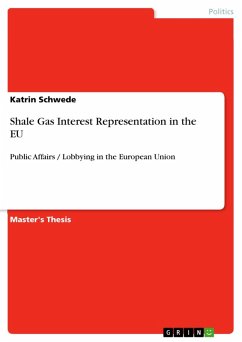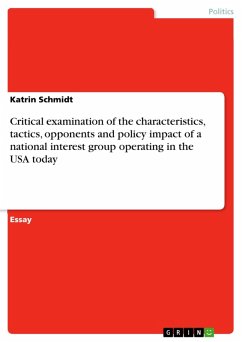Master's Thesis from the year 2012 in the subject Politics - Topic: European Union, grade: A, Brunel University, course: Public Affairs & Lobbying, language: English, abstract: The European oil & gas industry is concerned about the growing uproar and opposition against shale gas. Despite shale gas's importance and viability in North America, the potential for the development and recovery of shale gas in Europe is limited due to stricter regulation, legislation, and higher population density. There is going to be significant legal and regulatory developments relating to unconventional gas all expected in the coming years, including a possible challenge being raised against hydraulic fracturing. This case study sets out to investigate the strategic considerations and lobbying activities undertaken by the shale gas industry, and to examine opportunities and challenges for the shale gas industry to influence EU policy-decisions. Previous attempts to lobby national and EU institutions have been rather sporadic, but there is great potential and willingness to streamline and channel expertise and information, which are critical resources for acquiring access to the EU policy process. This paper looks at the theoretical framework of strategies of EU interest representation, more specifically at the way corporate and organisational factors influence the political strategies of shale gas interest groups, and how firms' lobbying strategies need to be adapted to the complexity of the EU policy process. Resulting from this analysis, it is argued that the shale gas industry needs to form ad--hoc coalitions, which would allow to operate with the flexibility required in the dynamic, multi-level and technical EU energy sector.
Dieser Download kann aus rechtlichen Gründen nur mit Rechnungsadresse in A, B, BG, CY, CZ, D, DK, EW, E, FIN, F, GR, HR, H, IRL, I, LT, L, LR, M, NL, PL, P, R, S, SLO, SK ausgeliefert werden.









